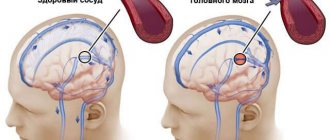Heart failure is a disease that is accompanied by insufficient contractility of the heart, which does not meet the metabolic needs of the body
A healthy heart easily pumps blood from the left ventricle through the body to the organs. This allows you to provide them with oxygen and essential nutrients. After fulfilling its saturation function, the blood returns to the heart, but to the right side. From there, the blood is sent to the lungs, where it is saturated with oxygen and again begins its path through the left ventricle.
In other words, the disease is a weakening of the very pumping function of the heart. The lesion occurs either on the right side of the heart or on the left (right and left ventricular heart failure, respectively). Progressive disease may involve damage to both sides of the heart. In addition, deficiency can be chronic or acute.
Overview of Heart Failure
A decrease in the contractile force of the heart muscle leads to a decrease in the volume of blood ejection and venous stagnation in the pulmonary and systemic circulation. The internal organs do not receive enough oxygen and nutrients, and due to increased venous pressure, edema develops. Stagnation of blood in the lungs leads to respiratory failure and oxygen starvation of tissues. A slowdown in blood flow in the vessels of the legs provokes the formation of blood clots, which can then break off and clog the arteries of the heart, lungs, and brain, causing death.
Classification of heart failure
According to the speed of development, acute and chronic heart failure
. The first appears and progresses quickly - within a few days or hours, the chronic one develops gradually.
Acute heart failure (AHF)
can develop according to the right or left ventricular type, depending on the location of myocardial damage.
The following stages are distinguished in the development of chronic heart failure (CHF):
- Symptoms of hemodynamic disturbances appear only during physical activity; nothing bothers the person at rest.
- Signs of venous stagnation: in one of the circulation circles; in large and small circles.
- Development of irreversible dystrophic changes in internal organs.
Causes of acute heart failure
The immediate causes of acute heart failure may be:
- complications of CHF (pulmonary embolism - blockage by a blood clot);
- myocarditis, pericarditis - inflammatory diseases of heart tissue;
- hypertension in the acute phase (hypertensive crisis);
- arrhythmia;
- myocardial infarction, coronary heart disease, major stroke.
Causes of AHF
Automaticity of the heart - the ability to contract rhythmically can decrease due to heavy loads. Acute heart failure can manifest itself when the elasticity of the myocardial walls decreases due to inflammation caused by pathogenic bacteria and infections entering the patient’s blood after a viral disease (sore throat, meningitis, pneumonia, etc.). AHF can also be caused by diseases associated with impaired myocardial function.
In most cases, the patient's heart cannot eject the required volume of blood or accept the required amount into the ventricles. The main causes of acute heart failure:
- Diseases that reduce the contractile activity of the heart muscle: heart attack, myocarditis, surgery using an artificial respiration system.
- Weakening of the function of the heart muscle caused by impaired coronary circulation.
- Cardiac tamponade. Accumulation of fluid in the pericardial cavity, which leads to irregular contractions of the heart due to compression of the cavities.
- Hypertensive disease (hypertension), in which blood pressure rises above normal.
- Functional and morphological changes in the structure of heart valves and myocardium.
- Arterial hypertension, expressed as increased pressure in the system.
- Arrhythmia is a pathological condition that is accompanied by a violation of the heart rate, a change in the sequence and rhythm of heart contractions.
The following factors can also cause heart failure: focal brain damage due to stroke, electrical injury, brain injury, drug poisoning or ethyl alcohol intoxication.
Causes of chronic heart failure
The development of CHF is caused by chronic lung diseases, congenital and acquired heart defects and other pathologies, including:
- stenosis and/or insufficiency of heart valves;
- hypertension;
- myocarditis, pericarditis;
- cardiac ischemia;
- hyperthyroidism is an excess of thyroid hormones in the blood.
At first, the compensatory capabilities of the heart allow one to maintain hemodynamics at the proper level, but over time they become depleted and signs of illness appear.
Examination and treatment
Heart failure (HF) is a symptom complex of various manifestations associated with decompensated work of the heart muscle.
In some patients it is combined with pathologies of the pumping function of the heart, while in others there is a disorder in the normal process of filling and emptying the chambers. The disease can be independent or be a complication of a number of serious pathological conditions - from anemia to congenital and acquired heart defects. For diagnosis, various research methods are used aimed at assessing the functions of the left ventricle and the entire cardiovascular system as a whole. After diagnosis, it is extremely important to undergo the treatment recommended by the doctor, since self-medication in such a case is clearly impossible.
Make an appointment with a specialist, without queues, at a convenient time
+7
Sign up
Symptoms of heart failure
The clinical picture of this pathology depends on what type of insufficiency develops and in what circle of blood circulation venous stagnation develops.
In right ventricular AHF
The volume of venous blood in the systemic circulation increases, resulting in the following symptoms:
- feeling of increased heartbeat;
- swelling of the limbs;
- swelling of the neck veins;
- a sharp drop in blood pressure, pallor, weakness, dizziness.
For left ventricular AHF
Blood stagnation occurs in the pulmonary circulation (pulmonary), so the following signs appear:
- chest pain;
- cough with pale pink frothy sputum;
- dyspnea;
- the appearance of foam in the corners of the mouth;
- disturbance of consciousness, confusion;
- the patient takes a forced sitting position, slightly leaning forward, in which the condition improves slightly.
A person with AHF needs urgent medical attention. If such symptoms appear, do not hesitate, you must call an ambulance.
Symptoms of chronic heart failure:
- shortness of breath, at first only during physical activity, later - at rest;
- cyanosis of the nasolabial triangle, fingertips;
- swelling of the legs, which appears in the evening and disappears in the morning;
- an increase in the volume of the abdomen due to the accumulation of fluid in it (ascites);
- signs of dysfunction of the liver, kidneys, central nervous system.
If such symptoms appear, it is recommended to consult a cardiologist or therapist.
Left ventricular and right ventricular
Heart failure is a condition caused by the failure of the heart as a pump that provides the necessary blood circulation. It is a consequence and manifestation of diseases that affect the myocardium or complicate its work: coronary heart disease and its defects, arterial hypertension, diffuse lung diseases, myocarditis, cardiomyopathies. Symptoms and course:
There are acute and chronic heart failure depending on the rate of its development. Clinical manifestations vary with predominant damage to the right or left parts of the heart.
Acute left ventricular failure develops in diseases with a predominant load on the left ventricle (hypertension, aortic disease, myocardial infarction). When the functions of the left ventricle are weakened, the pressure in the pulmonary veins, arterioles and capillaries increases, their permeability increases, which leads to sweating of the liquid part of the blood and the development of first interstitial and then alveolar edema. Clinical manifestations of acute left ventricular failure are cardiac asthma and alveolar pulmonary edema.
With predominant damage to the right ventricle (right ventricular failure), congestion develops in the systemic circulation. Right ventricular failure can accompany mitral heart defects, pneumosclerosis, pulmonary emphysema, etc. There are complaints of pain and heaviness in the right hypochondrium, the appearance of edema, decreased diuresis, distension and enlargement of the abdomen, shortness of breath with movements. Cyanosis develops, sometimes with an icteric-cyanotic tint, ascites, the cervical and peripheral veins swell, and the liver increases in size.
Recognition:
The severity of heart failure is assessed on the basis of clinical data and is clarified with additional studies (radiography of the lungs and heart, electrocardiography and echocardiography).
Treatment:
Limiting physical activity, diet rich in proteins and vitamins, potassium with limited sodium salts (table salt). Drug treatment includes taking peripheral vasodilators (nitrates, apressin, corinfar, prazosin, capoten), diuretics (furosemide, hypothiazide, triampur, uregit), veroshpiron, cardiac glycosides (strophanthin, digoxin, digitoxin, celanide, etc.).
Left ventricular failure
Left ventricular failure occurs when the left chambers of the heart are damaged and overloaded. Congestion in the lungs - shortness of breath, attacks of cardiac asthma and pulmonary edema and their signs on an x-ray, increased heart rate develop with mitral heart defects, severe forms of coronary heart disease, myocarditis, cardiomyopathies.
Left ventricular failure is manifested by a decrease in cerebral circulation (dizziness, darkening of the eyes, fainting) and coronary circulation (angina pectoris); it is characteristic of aortic defects, coronary heart disease, arterial hypertension, and obstructive cardiomyopathy. Both types of left ventricular failure can be combined with each other.
Right ventricular failure
Right ventricular failure occurs when the right side of the heart is overloaded or damaged. Congestive right ventricular failure (swelling of the neck veins, high venous pressure, cyanosis of the fingers, tip of the nose, ears, chin, enlarged liver, the appearance of slight jaundice, edema of varying severity) is usually associated with congestive left ventricular failure and is typical for mitral and tricuspid valve defects, constrictive pericarditis, myocarditis, congestive cardiomyopathy, severe coronary heart disease. Right ventricular ejection failure (signs of it are revealed mainly by X-ray examination and electrocardiogram) is characteristic of pulmonary artery stenosis of pulmonary hypertension.
Dystrophic form - the final stage of right ventricular failure, in which cachexia develops (exhaustion of the whole body), dystrophic changes in the skin (thinning, shine, smoothness of the pattern, flabbiness), edema - widespread up to anasarca (total swelling of the skin and body cavities), decreased protein levels in the blood (albumin), disturbance of the water-salt balance of the body.
Diagnosis of heart failure
The examination program for a person with suspected heart failure includes:
- collection of complaints and symptoms;
- initial examination, listening to heart sounds and breathing sounds;
- ECG of the heart;
- Cardiac echocardiography (Echo-CG);
- X-ray of the chest organs;
- Ultrasound of the abdominal organs.
Diagnosis and treatment of heart failure in Medical
Our doctors select an individual examination and treatment regimen based on the characteristics of each patient.
All diagnostics and treatment are carried out using expert-class equipment certified in Russia and approved for use by the Ministry of Health of the Russian Federation.
When should you see a doctor?
The reason for visiting a cardiologist should be alarming symptoms from the cardiovascular system: pain in the heart, dizziness, pressure surges, swelling, palpitations, etc. You should not delay your visit to the doctor, because in the early stages it is much easier to treat and control the disease.
Drug therapy for heart failure
Treatment of heart failure is carried out by prescribing drugs that facilitate the work of the heart, improve the rheological properties of the blood and hemodynamics. Such drugs include:
- B-adrenergic receptor blockers;
- cardiac glycosides;
- angiotensin receptor blockers;
- diuretics;
- nitrates.
Dosages and combinations of drugs are selected by the doctor; during the treatment process, it is often necessary to adjust the prescriptions taking into account the person’s condition.
It is unacceptable to prescribe medications to yourself after reading about the symptoms and treatment of diseases on the Internet or on the advice of a pharmacist at a pharmacy. Do not deprive yourself of the opportunities of modern world cardiology - contact a cardiologist for medical help at the Paracelsus Clinic.
Make an appointment with a cardiologist
The best cardiologists at the private Multidisciplinary Medical Center in Moscow invite patients with any type of cardiac dysfunction to diagnose and treat them. If signs of heart failure are detected, the patient is prescribed a comprehensive examination, after which experienced specialists will monitor the disease through medication and other effective therapy.
You can make an appointment with a cardiologist for a fee by phone or using the feedback form. Check the price of initial and repeat appointments on the clinic’s website. If the patient’s condition is acute, cardiologists will see him without an appointment at any time of arrival at our center.
Moscow, st. Krasnodarskaya, house. 52, bldg. 2
+7
We work on weekdays and weekends from 8.00 to 21.00











